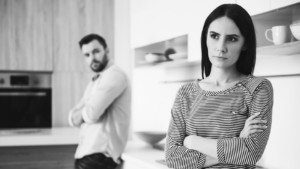An occasional fight is normal in any romantic relationship. It can even make couples stronger and bring them closer together, so they’re far from a bad thing!
But some fights are so intense and hurtful that they leave behind trauma, pain, and a rift between you and your partner. Here’s how therapists explain 5 ways couples can recover from a fight.
1 – Think About And Understand The Fight
A lot of people believe that their fights would work better if they just stuck to rationality – but that’s not always possible. That’s why processing the fight is so crucial. Here’s why you need to stop and think after arguments:
Fights Are Not Logical
Yes, logical issues are the cause of fights a lot of the time. But a fight itself, when escalating into one that needs intensive recovering from, stops being that. The brain rushes into fight vs flight mode, resulting in a flurry of incoherent actions and words that don’t reflect your real opinions or feelings – it’s all defensive! You need to take the time to pause and rewind.
Identifying Unintentional Abuse
Emotional abuse is a terrible, terrible thing – and in times of fights, unintentional emotional abuse is common. Name-calling, gaslighting, lying, and other similar actions done in fight-or-flight defense mode are all considered unintentional emotional abuse. These actions must be addressed and apologized for after the time-out. (Of course, do note that any physical abuse or intentional emotional abuse means that the victim should leave the relationship and seek safe living elsewhere.)
Thinking On The Cause
A lot of fights seem to be over small and insignificant things, but the reason they erupt into full-blown shouting matches is because those small things are the tip of a very large iceberg. Find the root cause of the argument. Retrace your steps to what ignited the flames and reflect on why that issue was so heated and difficult.
2 – Give Each Other Space
A lot of couples feel that taking a breather and getting space to process the argument is “giving up” – but it’s not. When you have a big fight, your mind is scrambled, and as we previously said, it’s not a logical process. Repeatedly exposing yourself to things that make you go into panic mode is not going to increase rationality!
Remember, this isn’t just you giving your partner space – it’s you taking space for yourself, too, says psychologist Dr. Hal Shorey. You both need time to think on your own, process your thoughts, and reflect. Allow the most aggressive of the negative emotions to settle and rest so they are no longer raging and dictating your every mood.
It can be especially frightening if your partner needs more space than you do, or if you don’t feel like you need the space but they’re asking for it. Do keep in mind that they aren’t necessarily asking for space because they dislike you, or because this is all leading to a breakup. They are communicating their need to process the situation in a clear and concise way, and you should respect that – and take advantage of the time to do your own thinking.
Here are some things to keep in mind while you’re each getting your own space or giving your partner theirs:
Don’t Punish Them
If your partner needs space, don’t punish them for it. Don’t give them the cold shoulder, judge them for not being “in it” with you, or hold it against them. Remember, the need for space is conveyed through honest communication. Respect that!
Don’t Cling
Some people naturally feel more clingy after fights. They feel a desire to be physically close to the other person. That’s fine and valid, but if it’s not a manner shared by your partner, you will have to restrain yourself. Clinging can harm your partner if they need a breather. Distract yourself with things that make you happy instead.
Don’t Waste The Time
Even if you feel fine, there are likely to be some issues to reflect on. While you’re both getting space, find those issues and think about them. Is there something that made you say what you said? Are there things your partner did that really rubbed you the wrong way? What can you both do to avoid this in the future?
Reassure Them
If you’re the one who asks for space, reassure your partner first. Tell them you love them and that you will get through it together and be alright, but for now, you need to manage your thoughts. Be honest and remember how much you love them as you speak.
Don’t Take Too Long
Giving each other space doesn’t mean spending a week apart. You should aim to try and reconvene after a short time thinking about it. Studies show that short time apart is positive and healthy after fights, but too long, and the fights fade to half-remembered emotions and amplified feelings. Set a time limit and agree to come back and talk things through once that time is up – and keep that promise!
3 – Communicate In A Positive Way
As old of a saying as it is, the fact remains that communication is the number one solution to most if not all relationship problems, says Dr. Ron Burriss, an evolutionary psychologist who studies human attraction. Though there are differences between men and women in terms of the ways they prefer to make up after a fight, there’s one uniting factor that all genders rate in the most positive way: communication.
But you can’t just start talking and hope for the best. You have to communicate in a positive way. Here’s how:
Be Open From The Start
When it’s time to start talking again, work hard to be open to your partner. It’ll feel difficult at first but push through it. You have to meet each other halfway with an open mind and heart.
One Step At A Time
If multiple issues came up during the fight, go through them one by one, and only move on when you’re both ready to. Don’t bring up other issues outside of the fight unless it is very relevant to the specific issue at hand.
Don’t Allow A Rematch
There will still be tensions and emotional unrest when you try to resolve the issues from the fight. Keep your emotions in check, aim to understand your partner, and don’t fall back into old patterns that could reignite the fight.
Fight Fairly
You know your partner very well, and you know what buttons to push to get to them. Don’t push those buttons. Fight fairly and never hit below the belt. Respect your partner or your relationship will become toxic.
Don’t Accuse
Accusations come in the form of “you” language. “You never do…” Or, “You always…” “You just don’t…” These all sound like accusations and will put your partner in defensive mode. Use “I” language instead so they understand where you’re coming from: “I felt (blank) when you did (blank).” “I didn’t like it when…” “I feel like…”
Listen To Understand
Take turns speaking about your perspectives and feelings. When it’s your partner’s turn, listen quietly. Don’t spend that time thinking of what you’ll say next. Focus on really trying to understand them and what they’re saying.
4 – Accept Responsibility
No fight is purely one person’s fault. You are responsible for it, too. You need to accept responsibility and realize that you hurt your partner. Here’s how to do so:
Accept It’s Not A Competition
You don’t have to be “right”. You don’t have to “win”. This is a relationship – a partnership that means it’s you and your partner versus the problems, not you versus your partner.
Don’t Be Defensive
It can be distressing to hear your partner talk about how you made them feel. Whether you meant to or not, you did those things. Think about it: even when you accidentally bump into someone in public, you apologize. So when you accidentally harm your partner, you should apologize, too.
Acknowledge How They Feel
Even if you disagree with your partner, acknowledge that their pain is valid. Work to understand where they’re coming from and really put yourself in their shoes.
Repeat Their Statements
When your partner expresses their feelings, respond in kind. Start with a phrase like “It sounds like you felt…” and then repeat their statements in your own words to show that you understand.
Apologize
Don’t forget that sincere apology can go a long way. Truly, genuinely apologize for what you’ve done and make sure your partner knows that you mean it, and promise to work towards preventing it from happening again.
Commit To Making Change
It’s very easy to apologize without really taking steps towards change, says licensed marriage and family therapist Anita A. Chilapala. Acknowledge your wrongs and reflect on them, focusing on how to better yourself to avoid this in the future.
Schedule Further Check-Ins
Once you think you’ve gotten to the root of the problem, schedule a check-in time where you both come together to reflect on both of your progress, discuss what’s going really well, and talk about what needs more work. That way, the points you bring up don’t end up getting forgotten.
5 – Make Up
Now that the fight is over, you need time to heal the relationship. After especially difficult fights, this can be very difficult. Here are some things you can do:
Take Time To Spend Together
Schedule a simple, no-stress date night: going out for dinner, watching a movie in the cinema, cooking together at home… anything at all where you only focus on being together. This helps you begin to bond again and reconnect.
Laugh Together
It can be hard to find humor after a fight, but laughing together can trigger positive thinking due to the release of feel-good hormones.
Get Intimate
Intimacy after a fight can help both of you feel closer, and for some people, it’s their favorite way to make up. Just make sure that you’ve already dealt with the issues from the fight before heading to the bedroom!
Do Things You Love Together
You don’t need to plan a date night to spend a little time doing things you both like. Order takeout from your favorite place. Bond over a shared hobby. When you feel good doing things you love, you release tension, says Dr. Holly Parker, author, a lecturer at Harvard, and psychologist. Studies show that emotions from positive thinking can work wonders for resolving fights and conflict.
Final Thoughts On Some Ways Couples Can Recover From A Fight
It’s not unusual for couples to fight. What matters is that you and your partner are committed to working together to overcome your arguments. At the end of the day, love, commitment, communication, and effort can work together to heal any relationship.





















